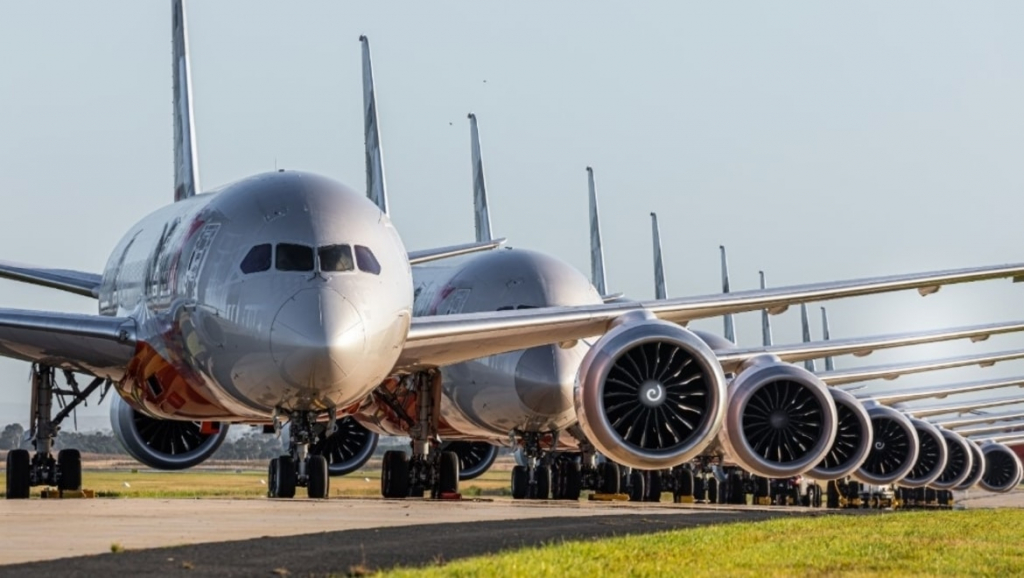
Australia’s firefighting union has accused Airservices of reducing the number of emergency crews at airports to below regulated levels – despite the danger presented by grounded planes full of fuel.
United Firefighters Union of Australia president Greg McConville said, “Our quiet skies are creating a powder keg at Australia’s airports.
“Most of Australia’s airports are in residential areas and there’s a genuine risk people will lose their homes, and their lives, if the worst happens.”
Airservices, which has control over staff deployment at Aviation Rescue and Fire Fighting Services, said in response it would “always ensure it has the appropriate staffing numbers to meet [Civil Aviation Safety Authority] requirements and to ensure the safety of the travelling public”.
The union commissioned the University of Newcastle to investigate the “level of preparedness” at Australian airports and concluded emergency services were operating at “below standard crew levels”.
It also said it found Sydney International Airport was storing 90 grounded planes, Brisbane 70, Perth 65, Avalon 36 and Adelaide 15, which it added were “well above regular levels”.
“Across Australian airports, planes are being stored at record levels, but fewer aviation fire fighters are there ready to respond,” said McConville.
“At our largest two airports, Melbourne and Sydney, we risk losing 32 staff if we don’t properly maintain the right ARFFs category.
“Australia’s airports and aviation safety regulations were never designed to accommodate a mass grounding. Scaled back fire crews at airports is creating a risk to billions of dollars of assets and vital infrastructure.
“Without aviation firefighter crews on-site and fully equipped to respond, Australia’s aviation industry could go up in smoke. During the grounding, each day planes must go through regular maintenance, which carries the risk of something going wrong.
“This risk is compounded by the fact that our airports now have larger than normal fuel reserves. Ground damage is an under-appreciated aviation safety hazard.
“An aircraft full of fuel at the gate is akin to a bomb in a confined space.”
However, the union appeared to direct its strongest criticism for the government, which ultimately controls Airservices funding.
It argued that unless it supported the organisation further, younger recruits would consider leaving, which would ultimately stem the country’s ability to bounce back from the pandemic.
The lack of services in the air has ultimately hit Airservices finances, due to fewer fees and levies being paid by airlines.
















Craigy
says:So the bottom line here is the Union has it’s hand out for Federal government money.
JL
says:The union only finds it appropriate nearly 5 months into a pandemic now and they fear that it’s only an issue now? I’d much rather a union be direct and say we need to keep our firies in the job rather than you (Australian aviation) and them propagating sensationalist pieces that only reduce creditabilty in providing factual and concise reporting on our industry.
James
says:Unios, corrupt organisations killing Aussie businesses one step at a time.
Tim
says:This story seems to imply that the parked planes (those not in service) have fuel aboard? Is that the case? And perhaps too the fuel stored at the airport?
Or have I misread that totally – and it’s only referring to planes at gate in service having fuel aboard.
Blood
says:A measured response is required that ensure the inherent risk is evaluated properly and controls are in place to manage the residual risk now and moving forward. What concerns me if Air Services reduces the ARFF capability further when we are on the other side of the COVID-19 pandemic. There will be a reduced emergency response capability that is deskilled at our airports. Further to this they just don’t respond to aviation incidents, they respond to all other incidents/risks on the airport environs, which includes a first response capability to first-aid calls. This is a concern due to the geographical size of airports and busy ambulance services!